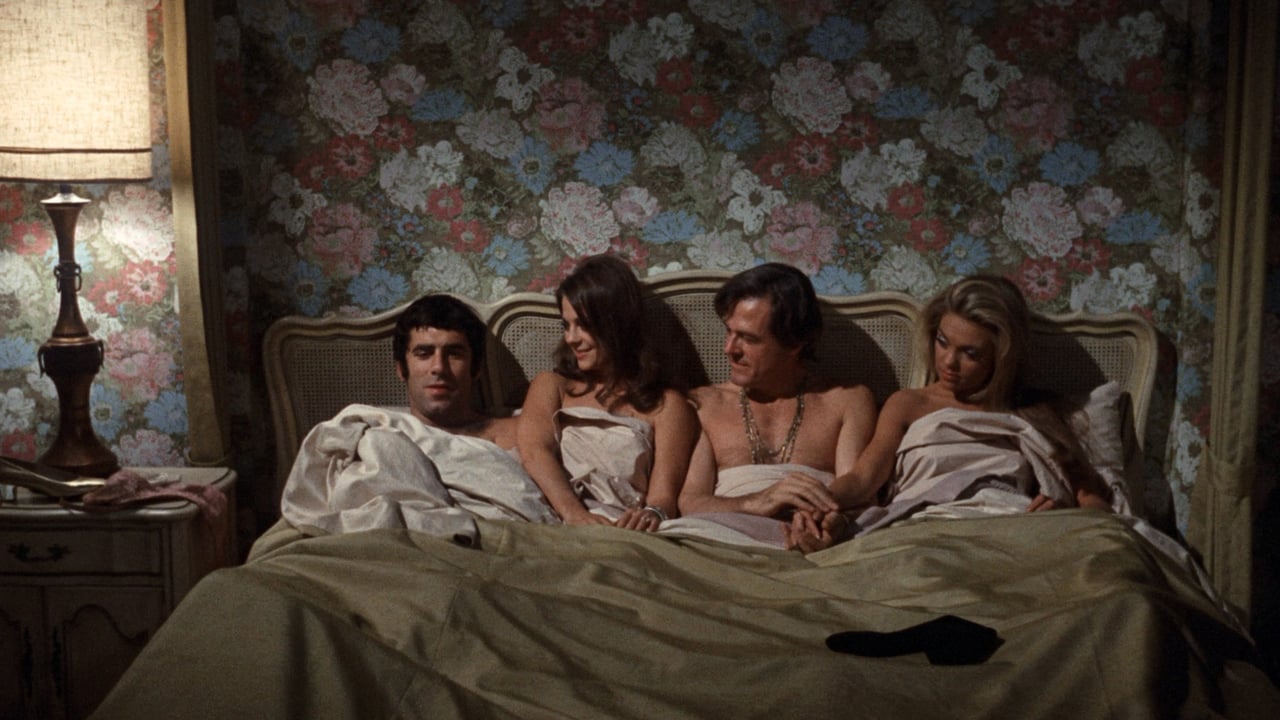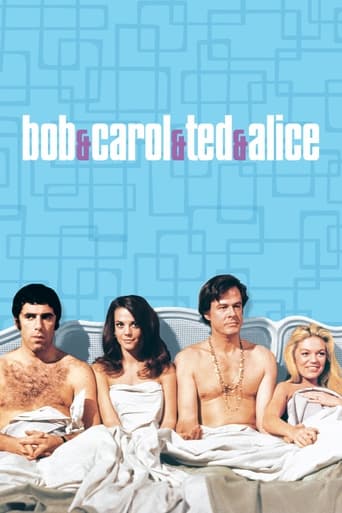

Paul Mazursky's directorial debut ranks with his best. Though B&C&T&A lacks atmosphere and could use tighter editing, it remains one of the 60s top comedies and one of that decades best films. Far better than the insipid comedies Hollywood churned out with Jack Lemon, Peter Sellars, Tony Curtis and Doris Day. In some respects a period piece, B&C&T&A is still funny and pointed today. The 4 leads are believable as couples and friends and Wood, Cannon, Gould and Culp have rarely been better. Gould and Cannon make their long scenes really work and Cannon is a standout especially in a scene with her analyst. Wood is far more nuanced and relaxed than she was in her previous comedies: Penelope, The Great Race, Sex and the Single Girl. The use of improvisation and long uninterrupted scenes works as well here as in any Cassavettes' film and the final scene is inspired by Fellini.
... View MoreI called "Bob & Carol & Ted & Alice" a vague film because there are very few certainties in the film. If you want a movie with a clear message and ending, then this film is NOT for you. I really think what you think of the movie is entirely dependent on the viewer and how they interpret what they see. I see it's listed as a comedy, but I could easily see someone thinking it's a drama. I could also see it as an endorsement of sexual freedom--or a film about the importance of fidelity in a marriage! Bob and Carol go to an encounter weekend--the sort of pseudo-therapy type group that was gaining popularity in the late 1960s. During the opening credits as they arrive there, you see lots of nudity--though the rest of the film is amazingly skin-free. There, they learn to let go of their inhibitions and be completely honest with each other--or at least try to be. The result is that they become closer as a couple--which could lead to serious complications when Bob tells Carol about an affair he recently had. But, using the model of their encounter group, Carol isn't upset but happy that they can be this honest. Later, when their best friends Ted and Alice hear of this, it throws them for a spin--how can a couple be THIS honest and still remain a couple?! Later, this new-found freedom leads to a four-some--a four-some that is really much more tease than please. Following this, the film ends in a manner that is just plain bizarre.I just don't know what to think of this film. While the acting pretty good and the film quite arousing at times, it also will no doubt be frustrating because just when you think the fireworks are going to occur, the film ends! Sexy but unsatisfying.
... View MoreThe 60's, a decade of rebellion and expressionism can happen. With this movie, you got a great cast of stars to make this movie worthwhile. Robert Culp and Natalie Wood play Bob and Carol Sanders. An Los Angeles couple who just returned from a retreat to express "free love" to one another. Their friends Ted and Alice Anderson (Elliott Gould and Dyan Cannon) are the exact opposites of Bob and Carol. So what do they do? They head out to "Sin City", Las Vegas, Nevada. What is it? Not to gamble, but to have an orgy. Are they going to be content with that? It is to say. No one one was truly faithful with each other. Especially Bob and Carol. Even Ted was a very naughty man as well. So everyone gets one big room, get undressed and all four of them are in one big bed. Kissing each other: Bob and Carol and Ted and Alice. Hence the title. Of course, Bob did kiss Alice and Ted kiss Carol. After that night, it was very bewildering for all four of them. Back in the 60's, I thought only the hippies practice free love, who would ever know. Great movie, great plot, great cast. It's a gem one will never forget.5 stars!
... View MoreThe ending to Bob & Carol & Ted & Alice is not a "cop-out" in the conventional sense. Although many people may have wanted to see the characters go all the way just to see what happens, it was inevitable that they give in and not do it. The cop-out exists mainly in the realm of counterculture values. The characters in the film had been preaching free love constantly, and even went so far as to deliberately have sexual affairs with other people just to prove to each other that they really believed in their values of sexual freedom. If they were so free, why couldn't they swap couples and have sex with each other? Its a cop-out that we don't get to see these members of the counterculture living up to their own words. They say they are sexually free, but are they really? I would have liked to see how the four would have dealt with the emotional consequences of making love with each other's soul mate. The effects of such an orgy would be mentally devastating- which is clearly why they avoided it in the end. This decision pokes a hole in the free-love movement, and begins to question the true meaning of love and relationships. It seems that while people are capable of affairs with strangers, they are never truly free to have sex with anyone. As an audience, we begin to realize that the counterculture is not as free as it seems to be. Free love sounds like an amazing idea- empty sex with whomever, whenever, and no one has any emotional ties or consequences. Yet it may not be truly freedom.Bob and Carol go out of their way to visit a new-age, counterculture Guru at a psychedelic therapy session. They learn how to get out all their negative emotions, and gain a freer perspective on life, love, and sex. They think that they have been elevated to a new level of consciousness, and are no longer bound by the conventional rules of the establishment in regards to relationships. Bob and Carol are released from jealousy, and are capable of having sex with anyone with no emotional flack, and still carry on a natural, loving relationship with each other. In fact, they are so adamant about it, that they try to convince their friends, Ted and Alice, to think the same way. This ideal soon begins to break down, however. When Bob tells Carol about his affair with a blonde woman, he is shocked and agitated to find that Carol doesn't seem to care. In fact, she responds in a loving and nurturing manner, and even comforts Bob for having gone through such an experience. Bob is initially outraged- his natural human instincts are kicking in for a moment- and he thinks that if Carol doesn't mind then she must not really love him. Carol gently explains that its all okay, and reminds him of his new free-love values, and that no harm is done. Eventually Bob agrees. Not much later, Bob comes home to find Carol in bed with a stranger. Initially he is outraged and hurt, like any normal person would be- but soon he comes to his senses and realizes that its all okay and its just sex with no love. He even offers the stranger a drink. As an audience, we at first think that such a lifestyle could be possible and even enjoyable- as it removes jealousy, anger, hatred, and many other horrible relationship problems. Yet in the end, we realize that all this freedom from emotions is actually just a suppression of true emotion. Bob is truly jealous and protective of Carol, and is incredibly hurt to find that she would cheat on him- however, the counterculture values have taught him to unnaturally suppress these human emotions that spring from his love for Alice. Instead, he attempts a kind of stoicism towards his feelings, and replaces his real love for Alice with a fake, open-ended, suppressive kind of love. It can't really even be considered love at all,. Its simply unjust to yourself to suppress your desire to love and jealously protect your lover. This is the nature of the free-love movement, and Mazursky chose to end the film in such as way that expresses this to the fullest. Bob and Carol and Ted and Alice are not emotionally capable of an orgy, and they end up giving in and accepting the fact that there is such a thing as a monogamous relationship. They truly love their lovers, and no one else. Sex cannot always be just sex. Humans are not machines- we cannot shut of our emotions at will. This is what makes us human.In the end, Paul Mazursky is not just poking fun at the counterculture with funny situational incidents, but is making a profound critique of their values. He wants the audience to leave the film questioning these values of free love, and come to terms with their human nature.
... View More